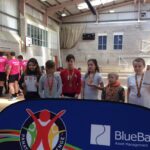Curriculum
Our curriculum is based around the National Curriculum 2014.
Overview
The national curriculum is a set of subjects and standards used by primary and secondary schools so children learn the same things. It covers what subjects are taught and the standards children should reach in each subject.
Follow this link to the Department of Education website.
Please use the links below to find out more about each subject, or view the following overview documents:
Curriculum theme overview 2025.2026
Our Curriculum Subject Areas
please expand the topics below for more information
Art and Design
Design and Technology
Year 3 Year 4 Year 5 Year 6
Cooking and Nutrition
During their time at Pickering Community Junior School children will learn about the seasonality of foods and how it is grown, reared, caught and processed. They will also research different products and understand which are the healthiest and why.
Children will also prepare and cook a variety of foods by following a recipe test they will then evaluate and modify the product or recipe where necessary.
As part of our DT curriculum offering children get time to learn and develop their cookery skills under the watchful eyes of Mrs Barr a key part of this work is learning about the principles of a healthy diet.
Mrs Barr continues to lead on our cookery work planning the recipes and working with parent volunteers. The Cookery Cabin is being well used throughout the year with all children benefiting from cookery lessons. In our most recent ‘pupil voice’ survey the Cookery Cabin was overwhelmingly the most popular learning space in school! Mrs Barr has worked really hard to ensure that cookery skills are progressive, health and safety requirements have been met and children enjoy the sessions.
English
French
Geography
History
Computing
Maths
Modern British Values
Modern British Values
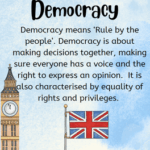
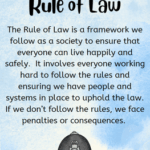
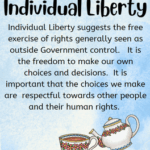
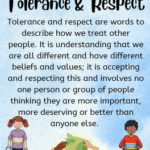
At Pickering Community Junior School, we are committed to serving the needs of our children and this involves preparing them for life in Modern Britain and to thrive in a society where the only constant is change. Despite our geographical location, we recognise the multi-cultural, multi-faith and ever-changing nature of the United Kingdom. In 2011, as part of the ‘Prevent’ strategy, and more actively from 2014, the Department for Education placed a statutory duty on schools to promote the Modern British Values. These values are:
- Democracy
- The Rule of Law
- Individual Liberty
- Tolerance of those with different beliefs and faiths and Mutual Respect
To promote these within our curriculum, our children develop:
- an understanding of how citizens can influence decision making through the democratic process;
- an understanding that rules are in place to govern and protect us and that there will be consequences if these are broken;
- an understanding that the freedom to hold other faiths and beliefs is protected in law;
- an acceptance that people having different faiths and beliefs to oneself (or having none) should be accepted and tolerated and should not be the cause of prejudicial or discriminatory behaviour;
- an understanding of the importance of identifying and combatting discrimination.
Through our curriculum, we are able to make real links between the values that our pupils hold and the lives of others.
Democracy
Democratic values are an explicit part of the ethos at Pickering Community Junior School. All adults, irrespective of role or responsibility, listen to the views of the pupils and value their opinions. The elections of School Council are the result of pupil votes within a democratic process and each classroom is equipped with a ‘Suggestions Box’ in which children’s ideas are welcomed. The class School Council representative then brings these along to the School Council meeting in order to be discussed. Our school House Captains are voted for by their peers in a whole-school ballot. Our children also have chance to have their voices heard through pupil questionnaires and pupil voice activities.
In Year 6, as part of their London residential trip, the children visit the Houses of Parliament for a tour and information session. They learn how people in the past and today have helped shape the laws that are made by parliament, as well as how groups and individuals, including the suffragettes, can bring about change in order to enable them to feel empowered to be active citizens in our democracy. The tour and session conclude with the children meeting with their local MP as part for an engaging and interactive question and answer session.
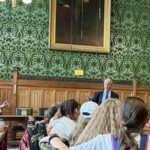
Rule of Law
The importance of laws, whether they govern the class, the school, or the country are consistently reinforced. Our school promotes six fundamental values of ‘Tolerance’, ‘Ownership’, ‘Community’, ‘Aspiration’, ‘Resilience’ and ‘Empathy’, which are integral to our learning and ethos. Time is taken in assembly to promote the school values and the reasons for having them. Our pupils are supported in distinguishing right from wrong, understand that rules and laws govern and protect us and understand that there are consequences if laws are broken. Visits from community groups, such as the Police, further reinforce this message.
Individual Liberty
Within school, our pupils are actively encouraged, and given the freedom, to make choices in a safe and supportive environment in order to become independent learners. We educate and provide boundaries for pupils to make informed choices and understand and exercise their rights and personal freedoms within lessons such as PSHE. They are supported to develop their self-knowledge, self-esteem and self-confidence.
Tolerance and Mutual Respect
Respect is at the heart of our values; our ethos is based on promoting and displaying respect for others. All pupils are taught the importance of self-respect, trust, honesty, equality and care. We fundraise for a range of charities to raise awareness of the needs of others. Our school is in an area that is not culturally diverse; we therefore actively promote diversity through celebrations of different faiths and cultures. Religious Education and PSHE lessons consistently reinforce messages of tolerance and respect for others. Within these lessons, our pupils are encouraged to discuss and respect differences between people, such as differences of faith, ethnicity, disability, gender, sexuality and differences within family situations (protected characteristics). Children study world faiths and we welcome visitors of different cultures, faiths and religions into school to share their beliefs and practices to enhance learning and understanding.
Protected Characteristics
In 2010, the Equality Act became law. This law protects people from discrimination, harassment and victimisation. Everyone in Britain is protected against discrimination because of the protected characteristics. As outlined in the Equality Act, the nine protected characteristics are shown below.
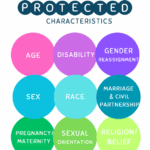
No form of discrimination is tolerated at Pickering Community Junior School and our pupils show respect for those who share the protected characteristics. Although each of the protected characteristics is not taught in every year group, they are all covered by the time the children reach the end of their time with us in an age and stage appropriate way.
Music
Personal ,Social, Health, & Citizenship Education (PSHCE)
Physical Education
Religious Education
Science
Sporting Excellence
Pickering Community Junior School has a proud record of supporting the children in our school to have a healthy lifestyle and a positive attitude towards sport. As a school, we are constantly striving to provide our pupils with a broad range of sporting activities and increase their participation in competitive sporting opportunities.
Over recent years, children have been involved in a variety of sports including archery, pilates, t-choukball, judo, circus skills (coordination and balance), giant games, the haka and table tennis. As a school, we always recognise children’s participation and involvement in sporting clubs and competitive events and encourage them to aspire to high levels of achievement.
We know that there is a wealth of sporting talent that happens outside of school that we want to nurture, support and celebrate. Parents and carers - please help school to celebrate these amazing sporting superstars by sending in information to school which we can add to the newsletter and our information below.
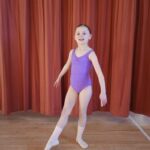
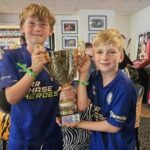
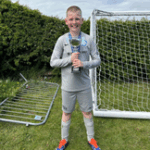
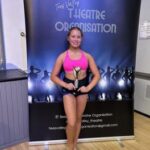
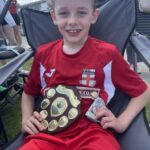
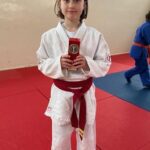




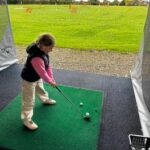
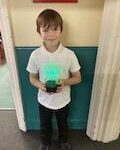
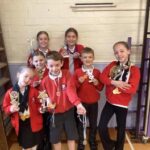

A group of Year 6 children attended a Panathlon event at Lady Lumley's School. The children took part in several different events and displayed excellent teamwork and sportsmanship throughout. They represented the school brilliantly and finished in 3rd place overall. All of the children received a medal and a certificate. Well done!
